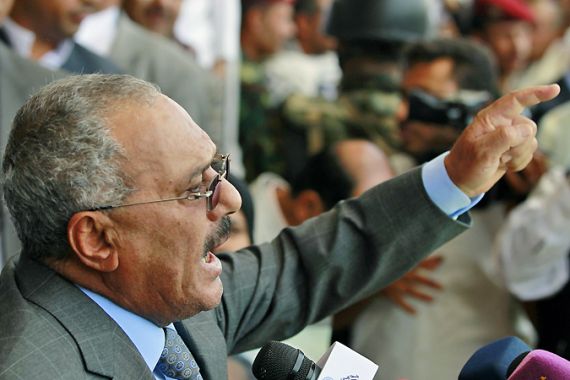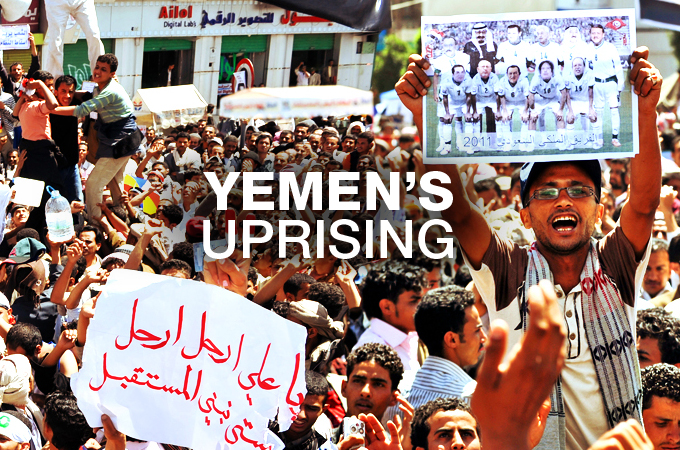Yemen protesters shot as Saleh vows defiance
Three protesters killed in city of Ibb, as president tells supporters “we will confront a challenge with a challenge”.

| The UN human rights office said that Yemen had approved a mission to examine violence during the protests [Reuters] |
Three protesters have been killed and at least 15 wounded after government forces opened fire at demonstrators in the southern Yemen city of Ibb.
The soldiers began shooting after protesters surrounded a building where the troops had taken shelter after a clash earlier on Friday.
Demonstrators, who are calling for president Ali Abdullah Saleh to stand down, then set fire to an armoured troop carrier.
Yemeni activists have dubbed the day a “Friday of Decision”, hoping for success in demonstrations which have been maintained since late January.
Saleh, addressing supporters who have re-dubbed the day a “Friday of Unity”, denounced opponents as saboteurs and said they should use the ballot box instead.
Speaking in the capital, Saleh said: “We will confront a challenge with a challenge.”
“We will not remain passive in the face of law-breakers,” the president said, warning the opposition to “stop playing with fire”.
Loyalists carried huge portraits of Saleh, and chanted “People want Saleh, People want Saleh”, while banners read: “Army is with you.”
Massive crowds had gathered in Sanaa, the capital, before Friday prayers to demand an end to Saleh’s rule.
Locals said baton-wielding military academy students joined soldiers and armoured vehicles facing vast throngs of demonstrators stretching 7km down a main street in the capital.
Meanwhile in the industrial city of Taiz, three demonstrators were wounded after they were fired on by security forces.
UN mission
 |
| Click here for more of our special coverage |
Navi Pillay, the UN human rights chief, has expressed alarm at what has been described as the disproportionate use of force by Yemen authorities against protesters.
The UN human rights office said on Friday that Yemen had approved a mission to examine the violence during
the anti-government protests in the country.
A spokesperson for the UN High Commissioner for Human Rights said that it had “been seeking access” and that “yesterday we received confirmation from the permanent mission [embassy] in Geneva that we can do a mission to Yemen”.
The spokesman said: “They [the Yemen government] suggested we visit at the end of June; we would like to go rather earlier than that, and we stand ready to deploy as soon as we can.”
Earlier on Friday, a military vehicle was attacked near the town of Maarib, killing five Yemeni soldiers from a unit under the command of General Ali Mohsen, who defected to protesters last month.
A security official said the vehicle was ambushed with a rocket-propelled grenade, and that Yemen suspects the attack was carried out by al-Qaeda fighters.
Economy hit
Friday’s violence came a day after Qatar pulled out of a Gulf Co-operation Council (GCC) mediation deal for Yemen, citing “indecision and delays in the signature of the proposed agreement” and “the intensity of the clashes” between protesters and government forces, which have left over 20 dead since Wednesday.
Saleh’s party said in a text message distributed by the Saba news agency that it welcomed Qatar’s decision, after the president had accused the Gulf country of inciting months of demonstrations aimed at unseating him.
A government source, who asked not to be identified, said: “Yemen will continue working with the rest of its brothers in the GCC for the success of the initiative.”
Recent developments in Yemen have strongly damaged the economy in the Arab world’s poorest country.
The months of protests have cost the economy $5bn, or about 17 per cent of Yemen’s 2009 gross domestic product, Hisham Sharaf, the trade and tourism minister, said.
“Several oil companies have quit the country and the refineries in the southwestern governorate of Aden came to a standstill a week ago,” said Amir al-Aidarou, the oil minister, adding that many foreign oil workers had left Yemen.
Aidarou said: “If the problem persists, the government will be unable to meet the minimum needs of the citizens. The situation will pose a catastrophe beyond imagination.”